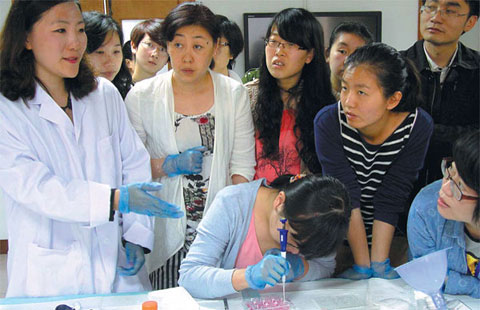U.S. scientists develop new monkey model for AIDS research
Updated: 2014-06-20 09:45
(English.news.cn)
|
||||||||
U.S. researchers said Thursday they have finally infected a species of monkey called pigtailed macaques with an AIDS-like disease after years of trying, a major step toward an animal model with which to study HIV-1, the virus responsible for most cases of AIDS.
HIV-1, a very selective virus, does not readily infect species other than its usual hosts -- humans and chimpanzees, which has made the search for effective treatments and vaccines for AIDS much more difficult, researchers at the Rockefeller University and the Aaron Diamond AIDS Research Center said.
The reason is simple as without an accurate animal model of the disease, researchers have had few options for clinical studies of the virus.
"HIV-1 only causes AIDS in humans and chimpanzees, but the latter are not a practical model and are no longer used for HIV/ AIDS research. Our goal has been to figure out how HIV-1 could cause disease in a new host," Paul Bieniasz of the Rockefeller University said. "By accomplishing this with macaques, we have taken a step toward establishing a new model for AIDS that can be used universally in prevention and treatment research."
According to the researchers, although pigtailed macaques have fewer defenses against HIV-1 than most other primates, they lack an antiviral protein that fights off the virus. As a result, the researchers altered both the virus and the macaque immune system in order to induce AIDS.
They bolstered the virus with a defense-disabling protein made by Simian Immunodeficiency Virus (SIV), a relative of HIV-1, and then encouraged the modified HIV strain to adapt to its new host by passing it from one monkey to another, resulting in six generations of infected monkeys and an adapted virus.

 Council of Fashion Designers of America Awards
Council of Fashion Designers of America Awards
 Fan Bingbing, first Chinese actress in Barbie Hall of Fame
Fan Bingbing, first Chinese actress in Barbie Hall of Fame
 Awarding ceremony of 2014 hito Pop Music held in Taipei
Awarding ceremony of 2014 hito Pop Music held in Taipei
 Zhao Liying's photo shoot for Children's Day
Zhao Liying's photo shoot for Children's Day
 'Taken 2' grabs movie box office crown
'Taken 2' grabs movie box office crown
 Rihanna's 'Diamonds' tops UK pop chart
Rihanna's 'Diamonds' tops UK pop chart
 Fans get look at vintage Rolling Stones
Fans get look at vintage Rolling Stones
 Celebrities attend Power of Women event
Celebrities attend Power of Women event
Most Viewed
Editor's Picks

|

|

|

|

|

|
Today's Top News
Greek PM salutes 'a game changer'
Hainan expands US presence to Boston
US to send 300 military advisers to Iraq
Evacuation plans made for Chinese workers in Iraq
Evacuation plans made for Chinese workers in Iraq
US citizens arrested on terror charges
Bomb plot defendant denied files by court
Rare stamp sets record at New York auction
US Weekly

|

|







